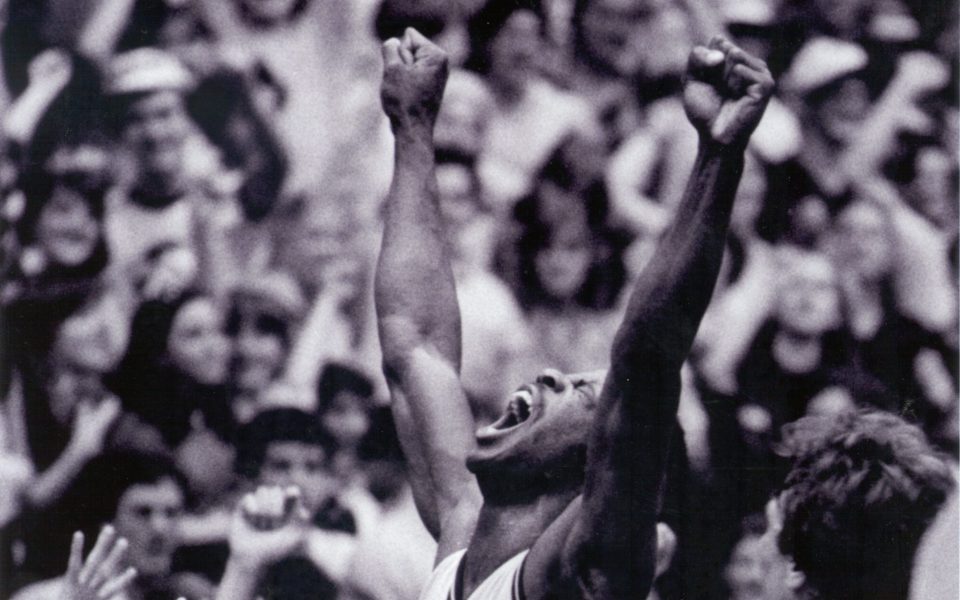High-school sophomore Gene Banks sat in a church pew in his mother’s basement, wringing his hands. He waited in the room — a small, subterranean sanctuary that brought many in his West Philadelphia neighborhood together — for a decision that would change the course of his life.
Banks played on a basketball team that would take part in the televised state championship game in a few hours. College coaches, reporters and fans from around the country had come to see the team and its young star, but one thing stood in the way: He wasn’t allowed to play on Sundays.
More than 40 years later, Banks — who would become an All-American at Duke University in 1980 and 1981, a 7-year NBA veteran, a 12-year professional player and the creator of the Gene Banks League of Greensboro — still remembers fretting in the basement pew, while in a separate room in his mother’s house, two Pentecostal pastors and a deacon from another church debated his fate.
“I thought they weren’t going to let me go,” Banks said, referring to the pastors. “They were really hardcore. They were my aunts, too, so they were like, ‘This ain’t gonna happen.’”
But finally, the deacon, a mentor to Banks in those formative years, entered the sanctuary with a hint of a smile.
“Get out of here,” he said.
The teenager ran. He caught two trains and arrived at the gym in time.
As Banks now defines it, he then proceeded to have the game of his life.
For Banks — who at age 57 maintains a sturdy physique to his 6-foot-7 frame — spirituality has always been present in basketball. Throughout his career, he experienced moments too unbelievable to deny that a greater force guided the events to their extraordinary conclusions — a spontaneous reaction, a leading hand.
On Senior Day in 1981, his last-second shot sent a heated game against rival UNC into overtime, which resulted in one of the most memorable victories in Duke basketball history.
Years later, playing on a team in France, Banks hit a buzzer-beater that saved his team from relegation and earned him a considerable financial bonus.
Immediately after the shot went in, Banks ran to the team’s general manager, asking for a phone. He called his wife, who was staying with her parents in Greensboro and was searching for a home for herself, her husband and their two daughters. Now with the financial means that came directly from his unbelievable shot, Banks told her, crying, “Go find that house.”
Like basketball itself, spirituality has also been a bridge to community, a catalyst for togetherness that reflects his convivial upbringing in West Philadelphia.
In San Antonio, during his first few years in the NBA from 1981 to 1985, he began the Gene Banks Fiesta League, a program that worked to bring disenfranchised Hispanic and African-American youth together through mentorship and community cultural awareness.
Off the court, Banks would attend Hispanic churches and other religious sanctuaries to express solidarity through worship.
“I’ve gone to a synagogue and to a mosque, and my thing was, it’s not so much that I’m praying to your religion,” he said. “I’m there enjoying the fellowship; I’m there enjoying the spirituality of it.”
Banks said he values learning those different traditions, as they introduce him to something new.
To some, sport and spirituality as tools for social unification may seem flimsy when compared to political policy or more direct community action. But in Greensboro, Banks has needed all the help he can find.
In 1994, now settled in the new house in Greensboro, Banks developed the Gene Banks League, a program that uses sports and academics to provide unity and structure to young people in order to support their growth and understanding of community.
But his endeavor proved harder than he expected.
“In Greensboro, I cannot get the support when it comes to youth programming,” he said.
More often than not, academic institutions, community and religious leaders, and those in political positions haven’t shown up.
“This is a clique town,” Banks continued. “People have certain cliques, people have their own agendas.”
Whether reestablishing a summer league or advocating for an athletic and cultural community center in east Greensboro, Banks hasn’t received the support he seeks. While he continues to use sport and spirituality as vehicles to bring communities together and engender progress, he doesn’t perceive a similar desire in other community leaders.
“If [social issues] aren’t gonna be addressed, it’ll keep going with the status quo,” Banks said. “They want to maintain the same thing.”
He would like to see seminars for people from different social divisions to come together and create dialogue to address issues.
“First and foremost,” Banks said, “we must be open to accept and hear the history of what has happened here. Secondly, where have we come from that history? Lastly, where are we gonna go?”
Coming from an upbringing of community, and having received the support and witnessed the changes realized in other cities, Banks emphasized the priority of communication.
“You have to talk,” he said decisively. “You definitely have to talk.”
Join the First Amendment Society, a membership that goes directly to funding TCB‘s newsroom.
We believe that reporting can save the world.
The TCB First Amendment Society recognizes the vital role of a free, unfettered press with a bundling of local experiences designed to build community, and unique engagements with our newsroom that will help you understand, and shape, local journalism’s critical role in uplifting the people in our cities.
All revenue goes directly into the newsroom as reporters’ salaries and freelance commissions.


Leave a Reply